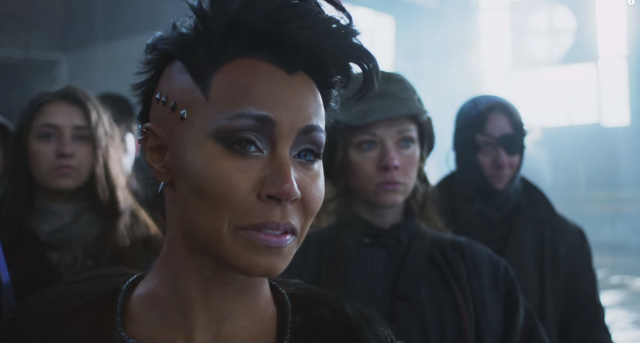Gotham showed up for its season finale with some fancy new haircuts, a few genuinely surprising moments, and a whole bunch of plot contrivances. Oh, and those last 3-minutes that change everything? They’re exactly the 3-minutes you expected to see at the end, that have been teased on every “Next week on Gotham…” trailer for the last 5 weeks.
The Mob War is raging in full, and Fish Mooney returns to Gotham City just in time, sporting a new steampunk style with a few cranial piercings and also having completely recovered from the bullet in her stomach. This is just the first of many things that happen off-screen that should have probably been dramatized while Gotham was busy desperately padding out its extra episodes. Other things that could have been shown instead of exposited include Selina Kyle joining Fish’s army as her new lieutenant (also with a matching Mad Max haircut), Fish somehow conspiring with Maroni mid-Mob-War to take out Falcone, and Maroni somehow being officially endorsed by City Hall as the top choice for Godfather of All Organized Crime (because I guess the Public Relations department at Gotham City Hall is about as subtle with their corruption as everyone else is).
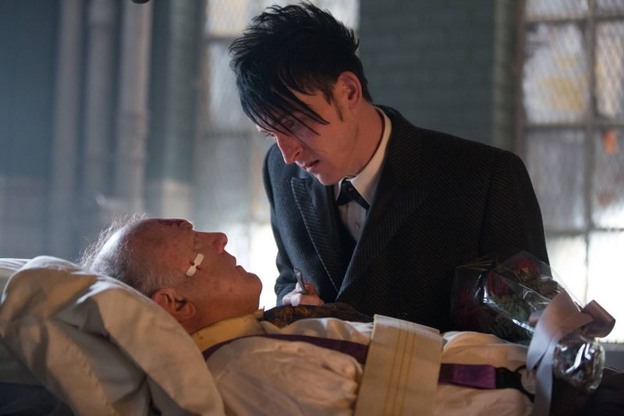
Speaking of Interesting Character Developments That We Don’t Actually Get To See But Would Have Been Cool To Watch, Jim Gordon is now a True Believer in the church of Carmine Falcone, whom he thinks is Gotham’s Best Worst Option for redemption, or Worst Best Choice for Mob Boss, or something. Gordon rescues Falcone from being killed by Penguin in the episode’s first of many, many, many, many, many moments where someone avoids certain death because their would-be killer is too busy waiting around for the next plot point to happen.
Another example of this is when Commissioner Loeb shows up with a bunch of Maroni’s thugs, also intent on killing Falcone. They let Gordon escape; he in turn opens fire with a machine gun and all six guys chase after him, instead of, you know, one of them going in and killing Falcone (or Penguin, or Butch) like they’re supposed to, even though all three of them are sitting ducks. It’s at this point in the episode where Loeb unintentionally breaks the fourth wall by saying “Hope is for losers,” directly into the camera, which I interpreted as a meta-commentary on audience members expecting this show to make any sense.
Meanwhile, Bruce and Alfred tear apart the study in hopes of finding some great secret about the late Thomas Wayne.
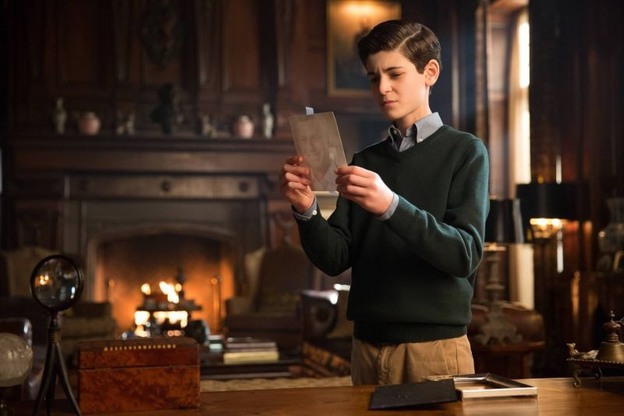
Gordon, Bullock, Falcone, Penguin, and Butch all end up escaping in a stolen ambulance (which is actually kind of fun). They head to one of Falcone’s warehouses…where Steampunk Fish Mooney is waiting for them. She ties them up and postures a lot instead of killing them, until Maroni finally shows up and joins her in the posturing-instead-of-killing. Things are looking grim until Maroni sexually harasses Steampunk Fish Mooney one too many times (maybe also a meta-commentary on this show’s general treatment of female characters?) and she puts a freaking bullet right through his head. This is awesome, and totally shocking, and incites a bloody shootout between the two rival gangs…and then my excitement quickly fades when Gordon-Bullock-Falcone-Penguin-Butch manage to escape again, and no one manages to kill them despite the bullets flying everywhere and them hanging on meathooks.
It’s weird; I’ve complained at length about this show’s lack of stakes, and yet here, we have a major Bat-continuity figure getting prematurely and unexpectedly offed…but then everyone else on Gotham ends up surviving when they clearly shouldn’t, just because they do. Sigh. You win some, you lose some.
Anyway, Bullock, Gordon, and Falcone make a run for it. Then they get captured again, this time by Selina Kyle who makes sure to react to Gordon’s stunned silence by saying “Cat got your tongue?” BECAUSE SHE’S CATWOMAN YOU GUYZ GET IT. Once again, no one is killed, and once again, they escape again, thanks to Penguin and Butch.
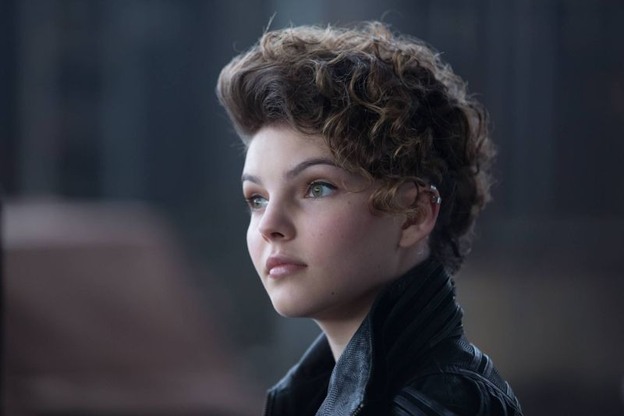
I should note here that Fish and Butch have some really nice moments together when she sees the trauma that he’s been through since he was captured by Zsasz. It’s clear that they deeply care about each other, even while it’s not clear what the hell Zsasz did that made Butch tap dance on command and then continue serving alongside Penguin in precisely the same capacity that he did for Fish.
This relationship comes to a head when Fish and Penguin are duking it out on the rooftop of the warehouse. Butch is all confused in the head over whether to side with Fish or with Penguin—so he just shoots both of ’em instead. Penguin’s able to recover in time and throws Fish off the roof, then climbs up on the ledge and sings “Look at me! I’m the King of New York Gotham City! Suddenly, I’m respectable! Starin’ right at’cha, lousy with stature!” while Butch looks on sadly. Being that there was so much focus on Butch’s scrambled psyche, I was surprised that he didn’t shove Penguin off the ledge when he has the opportunity. It felt like yet-another death-avoiding plot contrivance, but I’m also willing to entertain the possibility that (a) Brainwashed Butch did not have control of himself, or (b) Butch knows he’s a better lieutenant than a leader, and would rather play it safe as Penguin’s second-in-command than to be the top man himself.
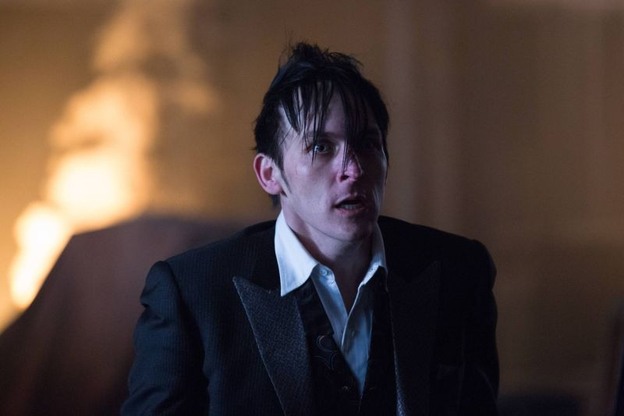
Meanwhile, Bruce and Alfred do some more digging through the study for secrets about Thomas Wayne. Neither one of them realizes that they live in a giant freaking mansion with lots of other rooms (yes, there are in-episode reasons given for their determination that Thomas’s secrets must be kept in the study, but they’re all really really convenient and contrived).
Also throughout this episode, Barbara Gordon is becoming increasingly unhinged, after her never-ending (for me) encounter with the Ogre. Lee Thompkins gives her a medical examine (because plot contrivances), and suggests that she seek out some trauma counseling. Barbara agrees to counseling…but only if Lee will be her trauma counselor, because Lee has some convenient training in trauma counseling and also plot contrivances. The session is held back at Barbara’s swank apartment (also crossing lines of professionalism here), and we’re treated to more of Barbara’s creepy pseudo-seductive friendliness, which is slightly more interesting now that we know it belies a sociopathic interior. There’s also a weird moment where Lee talks about “What happened to you…or, what was done to you,” which, while I understand what they were going for, didn’t really work as a meaningful psychological semantic distinction.
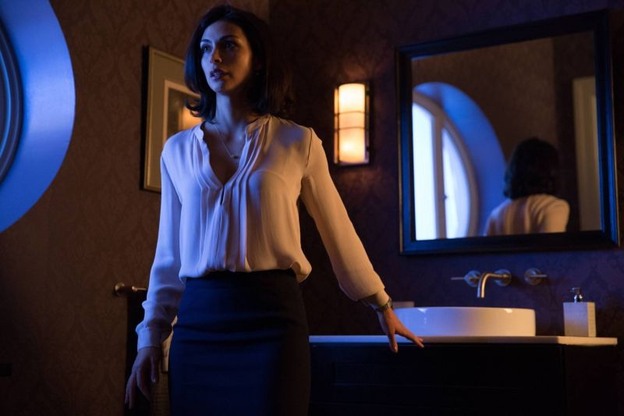
Barbara convinces Lee to stay and have a nice candlelit dinner with her. She reveals that she knows about Lee and Gordon, and alludes to possibly being a victim of domestic violence but only inasmuch as it relates to her interests in S&M (aaaargh), then eventually admits that it was her, not the Ogre, who killed her parents, for incredibly generic mommy-didn’t-love-me-enough reasons. Barbara then grabs a knife and attacks Lee, which is the other shocking and exciting moment of the episode…but then she lets Lee run away. Except Lee runs into the bathroom, and Barbara comes after her all “Here’s Johnny!” style, so why did she let Lee go in the first place? The two women fight some more, and then Gordon walks into Barbara’s apartment just in time to see Lee smash Barbara’s head into the floor until she stops moving.
Did I mention that Gordon was accompanied by Bullock and Falcone, because apparently running to his ex-fiance’s penthouse apartment (to which he no longer has keys, as this show previously made a point of) was the most logical safe house from Fish Mooney…even though Selina Kyle is working for Fish, and Selina was living at Barbara’s and…ya know what, I give up. Gordon comforts Lee now that she just killed his ex-fiancé and then has a surprisingly well-written moment on the balcony with Falcone. I really enjoy the Falcone-Gordon relationship, and in the version of Gotham from some parallel earth where it’s a much better show, I would have gotten to see more of that relationship. Maybe even watched as Gordon was slowly seduced by Falcone, who in turn was enlightened to the errors of his way by the White Knight of Gordon. Falcone gives his switchblade to Gordon, which we learn once belonged to Gordon’s father. “Your father was the most honest man I ever met. But he carried a knife,” Falcone says, which was so genuinely poignant that it must have cribbed from the aforementioned parallel earth version of Gotham where the show actually trades in such subtleties and insights. Then Falcone leaves.
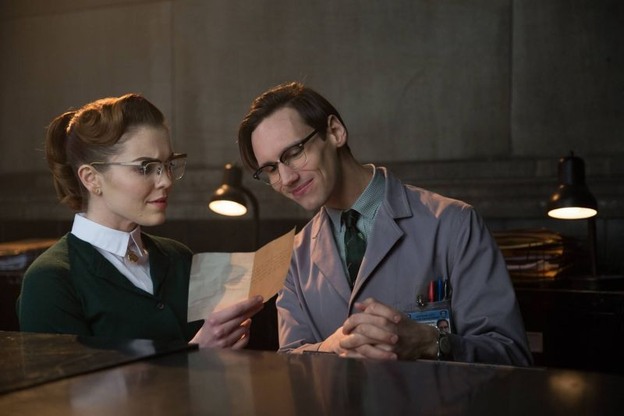
My other favorite moment of the episode is when Ms. Kringle confronts Ed Nygma at the police station, having realized that the mysterious letter from her mysteriously-vanished boyfriend spelled out “N-Y-G-M-A” as an acrostic poem. Nygma, of course, denies any knowledge of this odd coincidence…and then proceeds to have an absolute psychotic break as he struggles with the hubris of wanting to be caught and the lack of appreciation that he’s shown by Ms. Kringle. Sure, the editing is a little overdone, but it’s also suitably freaky, and if there’s anything to look forward to in Season 2, it’s Nygma’s continued breakdown.
Oh, and finally. Those last 3 minutes where everything changed? Bruce and Alfred discover a secret chamber hidden behind the fireplace of the Wayne Manor study—obviously alluding to the Batcave-to-be. This is after they spend the entire episode ransacking the study to find some clue about Thomas Wayne’s clandestine activities. Who knows what they would have found if they had bothered to look literally anywhere else in the giant mansion they call home?
THOUGHTS, REFLECTIONS, & OTHER OBSERVATIONS
Considering that the pilot episode began (as most Bat-things do) with the death of Thomas Wayne, I suppose it’s appropriate for the first season to end on a Wayne-related note as well. But while the pilot set up the conspiracy around the Wayne murder to be the main overarching story of the season, we didn’t actually end up getting any answers about it. Maybe that will be an ongoing thing throughout the show? Unfortunately, at this point it seems that no one besides Bruce even cares anymore.
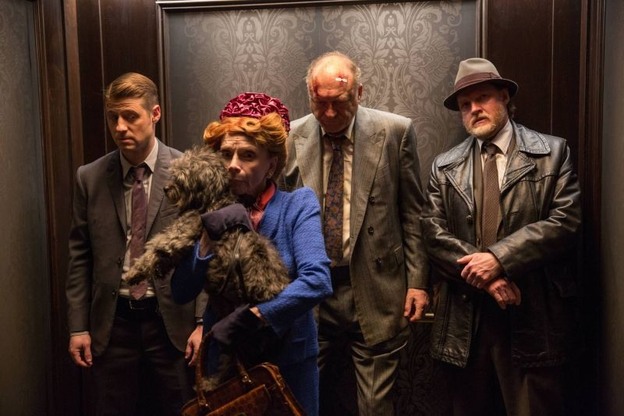
Let’s look briefly at everyone else’s journeys from the Pilot to the Finale:
- Penguin: Started as a lackey who aspired to be the New Crimeboss of Gotham. Ended as the New Crimeboss of Gotham. (Predictable, sure, but at least there was a payoff!)
- Jim Gordon: Started as the idealistic goody-two-shoes new cop; ended as a mildly-less-idealistic goody-two-shoes cop who is slightly willing to compromise.
- Harvey Bullock: Started as Jim Gordon’s grizzled older partner; still Gordon’s grizzled older partner, although at least he likes Gordon more now. (Also may or may not have been in a relationship with Fish Mooney? What happened with that?)
- Selina Kyle: Introduced as an orphaned teenager who may or may not have witnessed the Wayne’s murder; now an orphaned teenager in a flirtatious relationship with young Bruce Wayne, and is also a killer.
- Fish Mooney: Started as a Mob Underboss who aspired to become the Queen of Gotham; ended up, well, swimming with the fishes.
- Ed Nygma: Started as an awkward, riddle-obsessed forensic scientist; became an awkward, riddle-obsessed forensic scientist who is also hiding the secret of his first murder.
- Carmine Falcone: started as a well-intentioned crimeboss who did the ruthless things that he believed necessary for Gotham; now retired.
- Sal Maroni: started as a stereotypically Italian mob boss who favored idiosyncratic idioms; dead.
- Bruce Wayne: started as the sad, orphaned son of the billionaire Wayne family; definitely on his way to becoming a detective in his own right.
- Barbara Kean: started as Jim Gordon’s fiance; took a brief detour to explore her sexuality which all related directly to her issues with her parents, and then became a sociopathic killer. Now dead (probably).
Oddly enough it…looks like Barbara had the most dynamic and interesting arc on the show. Not that any of it made any sense, but still. Weird.
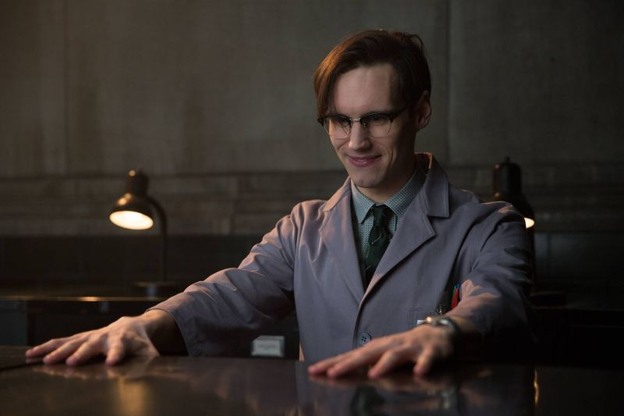
I understand the Gotham writing team has a certain challenge to face in creating a world that is a prequel to a world with which audiences are presumably familiar already. As such, there are certain parameters that they must work within—restrictions that limit their storytelling options. Sure, they did the surprising thing by killing off Don Maroni, but it wasn’t that integral to the Batman mythos, so it’s not that big of a deal.
For most of the season, the writers did hit the logical dramatic story beats. And yet, while there may have been compelling plot points or moments, I felt that the season as a whole lacked a strong narrative drive. Sometimes limitations can actually help a story, but the Gotham team seemed shackled by the Bat-world-to-be. As a result, it felt like a boat pulling into the Bat-harbor: we know where it’s going, and while there might be some turbulence along the way, you know where you’re heading, and it’s going to straighten out and end up right where you’re expecting.
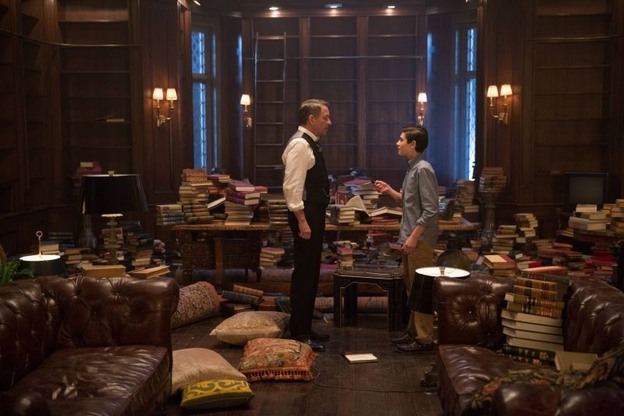
And I think that’s the biggest flaw with Gotham right now. They’re letting that narrative boat drift slowly through the harbor, taking us through a leisurely ride while pointing a few specific landmarks, rather than steering the ship and going on a journey, or surprising us with new discoveries. I’ve said before in these reviews that I want to see the core of the characters challenged: what if Gordon had stayed in Arkham for a long time? What if Gordon had gotten fired and became a vigilante? What if Gordon started actually actively helping out the Penguin? What if Gordon played along with Loeb, and let himself get corrupted for a while? What if Bullock had anything to actually care about or desire on the show? Sure, by the end, you’d have to bring the characters around; and if the show gets cancelled early, well, you still have a decade of time between now and the Batman in which plenty of implied actions can return our cast to whatever status quo they need to be at that point. In truth, I think the winks-and-nods to Batman continuity hurt the show more than help it, though I completely understand why the showrunners feel tied to them. But I genuinely think the show would be stronger if they took ownership of the show as its own entity and let it be driven organically by the characters, rather than pulled by the current of the once and the future Batman (look at Arrow as a good example of owning it and running with it; Gotham isn’t even as exciting as the flashbacks on that show).
Many shows struggle through uneven first seasons as they try to find their groove. Unfortunately, I’m not certain that Gotham has found theirs yet. There were individual episodes that were stronger than others, but I think the same problems plagued the show throughout. There were plenty of narrative lessons to be learned, but at this point there’s no way to predict how the story or narrative structure might change for Season Two. Instead, Season Two is shaping up to look like Season One, but with a Batcave instead of a Fish or a Maroni. I’d say here’s hoping for some nice surprises, but you know what they say on Gotham: hope is for losers.
Thom Dunn is a Boston-based writer, musician, homebrewer, and new media artist. Thom enjoys Oxford commas, metaphysics, and romantic clichés (especially when they involve whiskey and robots). He is a graduate of Clarion Writer’s Workshop at UCSD, and he firmly believes that Journey’s “Don’t Stop Believing” is the single worst atrocity committed against mankind. Find out more at thomdunn.net










